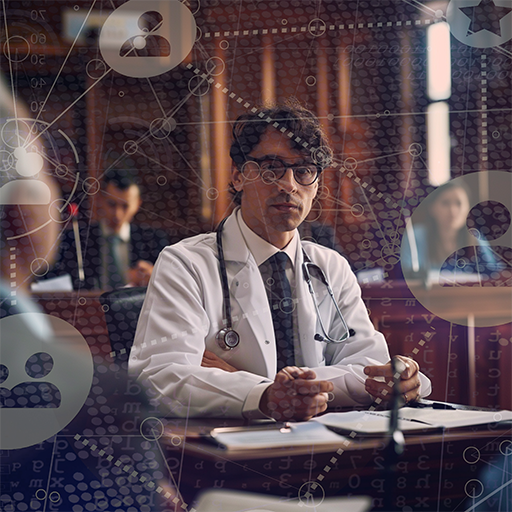CHALLENGES AND SUCCESS TIPS
Medical expert witnesses significantly impact legal cases by providing essential insights that help clarify complex medical issues. As a medical expert, your role is critical in various aspects, from interpreting medical evidence to defining standards of care. This article delves into your responsibilities, the challenges you may face, and tips for success in the courtroom.
Key Factors Lawyers Consider When Selecting a Medical Expert Witness for a legal case
When selecting a medical expert witness, lawyers consider several vital factors to ensure the expert will be effective in supporting their case:
Qualifications and Credentials
Lawyers look for experts with strong academic backgrounds, board certifications, and extensive clinical experience in the relevant medical specialty. The expert’s CV and publication record are carefully reviewed.
Relevant Expertise
The expert’s specific area of expertise should closely match the medical issues in the case. As a category, “medical expert” is expansive and includes specialties, subspecialties, and special call-outs, such as that time the team spent a couple hours figuring out how to showcase _________’s experience on dozens and dozens of cases with batteries? We thought that was pretty shocking, too.
Experience as an Expert Witness
Prior experience testifying in depositions and trials is often preferred. Familiarity with the legal process can determine an attorney’s selection. While this might put some new experts at a disadvantage, we encourage new experts to take on more minor cases and deposition.
Communication Skills
The ability to explain complex medical concepts clearly to a lay audience is crucial. Lawyers may conduct interviews to assess this skill. Experts on our platform will soon be able to indicate if they are available for a phone and/or video interview.
Credibility and Reputation
Lawyers research the expert’s professional standing and reputation for objectivity. Any history of sanctions or ethical violations would be disqualifying.
Availability
The expert must have sufficient time to review case materials, prepare reports, and testify as needed.
Location
Local experts minimize travel costs, and are, therefore, generally preferred. However, for complex cases, expertise weighs greater.
Fees
While not the primary factor, the expert’s fees need to be within the case budget.
Demeanor and Presentation
Lawyers look for experts who present as confident, articulate, and likable, as this impacts jury perception.
Conflicts of Interest
Attorneys carefully vet any potential conflicts that could compromise an expert’s objectivity.
Published Opinions
Lawyers review any relevant publications by the expert to ensure consistency with the case theory.
Recommendations
Referrals from other attorneys or experts in the field are often valuable.
Teaching Experience
Experts who teach in their field are often skilled at explaining concepts to non-experts.
The selection process varies, but it typically includes thorough vetting and interviews. Sometimes, attorneys may request mock testimony to ensure the expert will be effective in supporting the case. The goal is to find an expert who is highly qualified, persuasive, and credible to a judge and jury.
How a medical expert supports in a legal case
Providing Specialized Knowledge
Medical expert witnesses bring crucial scientific, technical, or specialized knowledge to the courtroom. Your expertise helps judges and juries understand intricate medical details, which are often pivotal in determining case outcomes. Explaining medical terminology, procedures, and conditions in layman’s terms bridges the gap between complex medical science and the court’s need for clear, comprehensible information.
Offering Professional Opinions
Your professional opinions are vital in legal cases. Based on your analysis of evidence and medical records, these opinions can determine causation, the standard of care, or the extent of injuries. For instance, in a medical malpractice case, your testimony on whether the care provided met accepted standards can be decisive. Your insights help the court understand whether a healthcare provider’s actions were appropriate under the circumstances.
Interpreting Medical Evidence
Medical expert witnesses excel at interpreting and explaining medical evidence, such as test results, imaging studies, and clinical data. This interpretation is crucial for the court’s understanding of the facts. Translating complex medical information into understandable terms enables the judge and jury to make informed decisions based on accurate and clear explanations.
Establishing or Refuting Standards of Care
In medical malpractice cases, defining the standard of care and determining whether it was breached are central issues. Your testimony can influence the outcome significantly by explaining what a reasonable medical professional would have done in similar circumstances. This aspect of your role helps the court assess whether the healthcare provider’s actions were within the bounds of accepted medical practice.
Assisting in Case Preparation
Your expertise extends beyond the courtroom. You assist attorneys in preparing their cases by reviewing medical records, identifying key issues, and suggesting lines of questioning for cross-examination. This collaboration strengthens the overall presentation of the case and ensures that the legal team fully understands the medical aspects involved.
Read more on this topic :
- State Bar of Michigan| Danger Ahead: Pitfalls and landmines in medical malpractice expert witness requirements
- National Library of Medicine| The Expert Witness in Medical Malpractice Litigation

Common Types of Cases Requiring Medical Expert Witnesses
While medical experts can be crucial in various cases, some of the most common include:
Misdiagnosis or Delayed Diagnosis Cases
In these cases, you explain proper diagnostic procedures, the standard of care, and how the misdiagnosis or delay affected the patient’s outcome.
Surgical Error Cases
Surgical specialists testify about appropriate surgical techniques, potential complications, and whether the surgeon’s actions met the accepted standard of care.
Medication Error Cases
Pharmacists and physicians serve as expert witnesses in cases involving incorrect dosages, drug interactions, or improper administration of medications.
Birth Injury Cases
Obstetricians and neonatologists testify about proper prenatal care, delivery procedures, and immediate postnatal care.
Anesthesia-Related Complication Cases
Anesthesiologists provide expert testimony in cases involving complications from anesthesia, explaining proper procedures and risk management.
Challenges Faced by A Medical Expert Witness in legal cases
Being aware of common challenges can help you prepare effectively:
Establishing Qualifications
You must demonstrate your knowledge, skills, and credentials to testify on specific medical issues. Prepare for the opposing counsel to scrutinize your qualifications.
Meeting Statutory Requirements
Many states have specific laws governing expert witness qualifications in medical malpractice cases. You need to meet these requirements, which can vary by jurisdiction.
Explaining Complex Concepts
Simplifying complicated medical terminology and procedures for a lay audience is crucial. Practice making complex concepts accessible and understandable.
Maintaining Objectivity
Provide unbiased opinions based on facts and medical standards rather than advocating for one side. Your credibility hinges on your perceived impartiality.
Dealing with Conflicting Evidence
Reconcile conflicting medical records, testimony, or other evidence to form and defend your opinions. This can be challenging but is necessary for your credibility.
Facing Cross-Examination
Be prepared to defend your opinions under rigorous questioning from opposing attorneys. Stay calm and composed to maintain your credibility. A medical expert witness in legal cases can come under intense scrutiny.
Staying Within Your Expertise
Avoid testifying beyond your specific area of medical expertise. Doing so can lead to your testimony being disqualified.
Addressing Standard of Care Issues
Defining and applying the appropriate standard of care can be challenging, especially when practices vary or are evolving.
Demonstrating Causation
Establishing a clear causal link between the alleged negligence and the patient’s injuries is essential for your testimony.
Keeping Up with Current Medical Knowledge
Stay current with the latest developments in your field to provide accurate and up-to-date testimony.
Success Tips for a Medical Expert Witness in legal cases
To succeed in your role as a medical expert witness, consider these tips:
Stay Calm and Composed
Maintain a level tone and demeanor to project confidence. Staying calm under pressure shows that you are confident in your expertise.
Answer Directly and Concisely
Provide clear, concise answers without unnecessary elaboration. Avoid appearing evasive or defensive.
Admit Limitations
If a question is outside your expertise, candidly acknowledge this. Honesty reinforces your credibility within your domain of knowledge.
Be Consistent
Ensure your testimony remains consistent throughout the proceedings. Inconsistencies can severely damage your credibility.
Avoid Arguments
Refrain from arguing with the cross-examining attorney. Professional, measured responses are more credible.
Clarify Questions
If you don’t fully understand a question, ask for clarification. Asking for clarification helps avoid misstatements and ensures your responses are accurate.
Stick to Facts and Opinions Within Your Expertise
Base your responses on facts and opinions within your expertise, avoiding speculation outside your knowledge area.
Maintain Eye Contact
Good eye contact projects confidence and openness. It helps build a connection with the jury and judge.
Use Simple Language
Explain complex concepts in simple terms that jurors can understand. Avoid jargon and technical language as much as possible.
Be Prepared
Thorough preparation, like preparing a response for likely cross-examination questions, helps you respond confidently and maintain credibility under pressure.
Conclusion
Serving as a medical expert witness is a challenging yet vital role in the legal process. By understanding your responsibilities, preparing for everyday challenges, and employing effective strategies, you can significantly contribute to the pursuit of justice. Your expertise helps courts understand complex medical issues, ultimately aiding in fair and informed decision-making. With thorough preparation and a clear understanding of your role, you can succeed as a medical expert witness and make a meaningful difference in legal cases.
Are you an Attorney?
We’re here to help! Let us connect you with qualified professionals who are available for depositions and testimonies. Our database includes over 15,000 experts with a wide range of specialties. Reach out today to fast-track your search for an expert witness.
Are you an expert?
Join a thriving community of over 15,000 experts at Expertinfo.com, where your knowledge is valued and your expertise makes a difference. With 40 years of experience in connecting experts like you with attorneys who need your specialized skills, we’re dedicated to facilitating successful collaborations. Don’t miss the opportunity to impact critical legal cases and expand your professional network. Reach out today and become part of our extensive database of leading experts. Your expertise isn’t just needed—it’s essential. Connect with us now and start making a difference!







